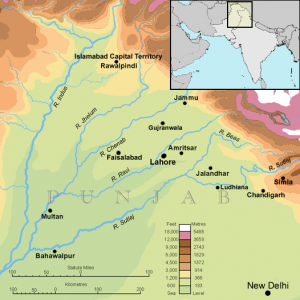
Who wouldn’t want to buy Punjammies? The company’s goods are “created by women who wish to remain free from sex-slavery.” If not out of guilt, you would do it for the comfortable, stylish, colorful and “ethnic-looking” garments, wouldn’t you?
The International Princess Project, the umbrella company of this brand, aims to “create pathways to freedom for women escaping the ravages of sex slavery to achieve lives of hope and dignity.” They claim to do so by setting up micro-enterprise sewing centers in parts of India that create jobs for women who would otherwise rely on income by prostitution.
A wide variety of punjammies are available via the company’s website, each one with a different print and a different name inspired by the subcontinent. This seems like a great idea, yes? Think again.
According to a company representative, the company’s CEO, Shannon Keith, came up with the name “Punjammies” after learning of a region as well as a type of clothing called “Punjabi” in an effort to combine two cultures.

Punjabi is a language spoken in the region of Punjab of India and Pakistan. Punjab, and its name, its language, and its culture is the heritage of Punjabi women, and not for the International Princess Project to commodify, especially since the articles of clothing that are named after this region are not made in Punjab. Other than the name itself, this particular project is unrelated to Punjab, the land of Five Waters (or Rivers), for which it is so affectionately named.
And the name of the individual clothing items just adds insult to injury. “Bhavani” is a person, not a capri pant to wear. “Traditional India” is rich cultural history, not a category of pajamas among “Large Floral,” “Small Floral,” and “Paisley.”
Stealing a heritage and profiting from disrespect and cultural appropriation does not empower the women of red-light districts in India (or anywhere else). In fact, it maintains power dynamics that empowerment efforts are supposed to work to dismantle. It is important to realize that empowerment is not a predetermined economic endpoint, but a process of realizing one’s abilities that have been oppressed by outside forces. Companies such as this one fuel a system of exploitative capitalism that oppresses communities for generations, in the name of temporarily helping one.
* * *
Navjot Kaur studies civil engineering at Columbia University. She participates in Sewa, Columbia’s social justice and community service organization based on core Sikh values. Simran Kaur is a senior at the University of Utah, in chemistry and gender studies, recently accepted into medical school. She is a member of SikhLEAD, the Sikh American Legal Defense and Education Fund (SALDEF)’s leadership development program.













Obviously, there are clear issues with the CEO’s knowledge of the differences between geographic locations, and branding issues that provoke a sense of cultural appropriation. However, I feel like there is no call to action for the uneducated reader (in terms of the ethical marketplace.)
For instance, IPP is not a rescue organization. IPP provides work for women who choose to become employed following/during their group home living (as a part of their safe home stay). I’m not sure if this article make people want to avoid purchasing social good products, and instead just purchase whatever from walmart? For the uneducated reader, there is no call to action. When you speak of the Punjammies as a “predetermined economic endpoint”, we must consider that the increase in price point goes alongside the increased price point which is what provides above fair trade wages needs to be justified.
I see where you are coming from as a fellow punjabi woman in relation to the ability of Punjammies to culturally appropriate in terms of the branding. However, I would like to see a clear line of critique between ethical, fair trade brands vs their branding.
It’s articles like these that make me feel a real disconnect from the social justice community.
I feel like people who agree with this are completely ignoring the fact that this organization is providing WORK FOR WOMEN TRYING TO ESCAPE SEX TRAFFICKING!
And personally, I like that they’re using the names of women who make the clothing to name their products. I think it adds a really personal touch to it.
As long as they are treating these women fairly and paying them well, is the poor naming of the company really the thing we should be focusing on?